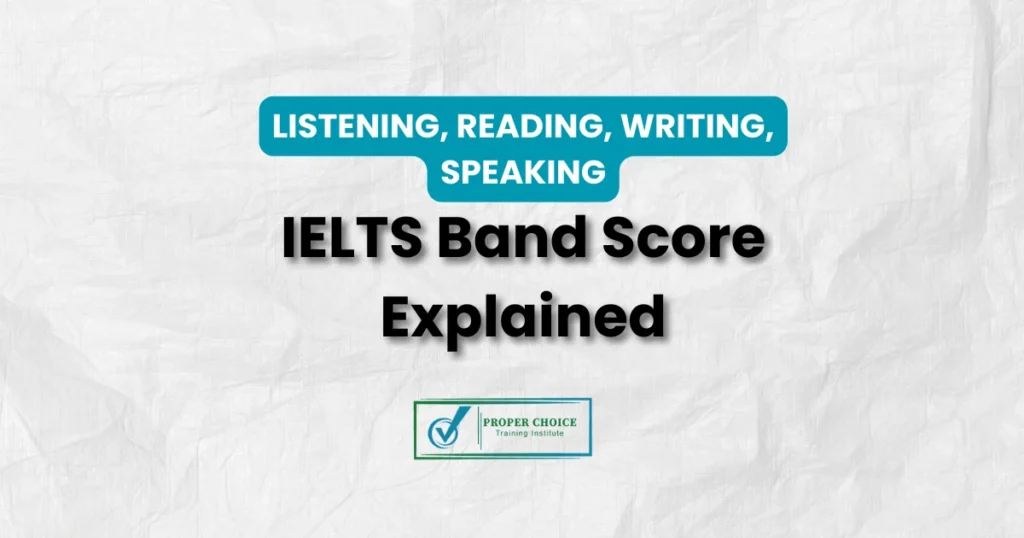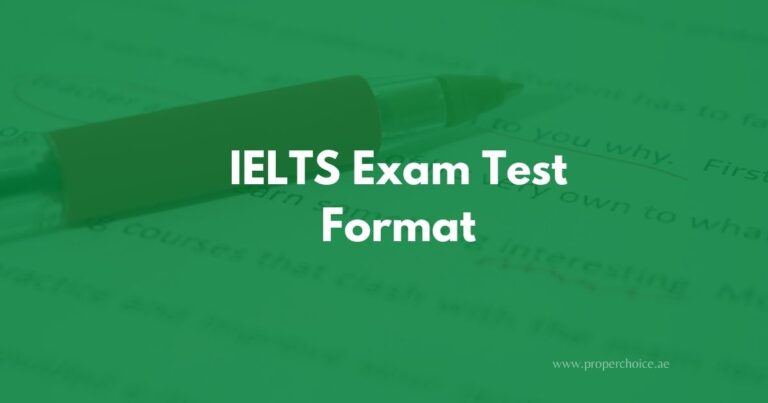IELTS Band Score Explained: Understand how IELTS scores are calculated for Listening, Reading, Writing, and Speaking. Learn what each band means and how to improve your score.
The International English Language Testing System (IELTS) is one of the most popular English Language proficiency tests for non-native speakers. It assesses students ability in listening, reading, writing, and speaking, and is widely accepted for study, migration, and work in English-speaking countries like the US, UK, Canada, Germany, etc.
The test assesses students’ English knowledge across four modules: Listening, Reading, Writing, and Speaking. Each of these modules is graded on a score from 0 to 9, and the overall score is an average of the four components.
The IELTS Test is conducted in over 140 countries worldwide. The IELTS Listening, Reading, and Writing module exam will be conducted together on the same day at the same time, but the speaking test may occur on the same day or the day before or after the exam date.
Understanding what each band means helps students plan their preparation journey strategically.
Table of Contents
1. Listening Band Score
The IELTS Listening module is the same for both General and Academic test takers. Listening requires familiarity with British, Australian, Canadian, American, New Zealand, and other English language speaking countries accents, along with an ability to follow conversations, lectures, and discussions.
The IELTS Listening test has 40 questions, and each correct answer receives 1 mark. The raw score out of 40 is converted into a band score as follows:
| Band score | No. of Correct Answers | Description |
| 9 | 39 – 40 | Student has fully operational command of language |
| 8.5 | 37 – 38 | Student is very good English user. Has operational command of the language with some inaccuracies |
| 8 | 35 – 36 | |
| 7.5 | 32 – 34 | Student is good user of English. Can able to handle complex language well and understands reasoning |
| 7 | 30 – 30 | |
| 6.5 | 26 – 29 | Student is competent user of English. Can use and understand fairly complex language |
| 6 | 23 – 25 | |
| 5.5 | 18 – 22 | Student is modest user of English. Able to handle basic communication |
| 5 | 16 – 17 | |
| 4.5 | 13 – 15 | Student is limited user of English. Has frequent problem in understanding and expression. Cannot handle complex English language |
| 4 | 11 – 12 | |
| A band score below 4 corresponds to a very limited command of spoken English, difficult to understand | ||
2. Reading Band Score
IELTS Reading has got different modules for General and Academic test takers. The difficulty level of the Academic module is higher as compare with the General module.
IELTS Reading assesses students’ ability to understand main ideas, details, inferences, logical arguments, and writer’s attitudes. Academic reading passages are more complex with academic vocabulary, while General training readings focus on workplace or social contexts.
Academic Reading:
| Band score | No. of Correct Answers | Description |
| 9 | 39 – 40 | Student is expert user of English along with fully operational command of language. |
| 8.5 | 37 – 38 | Student is very good English user. Has operational command of the language with some inaccuracies |
| 8 | 35 – 36 | |
| 7.5 | 33 – 34 | Student is good user of English. Can able to handle complex language well and understands reasoning |
| 7 | 30 – 32 | |
| 6.5 | 27 – 39 | Student is competent user of English. Can use and understand fairly complex language |
| 6 | 23 – 26 | |
| 5.5 | 19 – 22 | Student is modest user of English. Able to handle basic communication |
| 5 | 15 – 18 | |
| 4.5 | 13 – 14 | Student is limited user of English. Has frequent problem in understanding and expression. Cannot handle complex English language |
| 4 | 10 – 12 | |
| 3.5 | 8 – 9 | Student is extremely limited user of English. Able to understand only general meaning in very familiar situations |
| 3 | 6 – 7 | |
| 2.5 | 4 – 5 | Student is intermittent user of English. No real communication is possible. Has great difficulty in reading, speaking, and writing |
General Training Reading (easier texts, so score conversion is higher):
| Band score | No. of Correct Answers | Description |
| 9 | 40 | Student has fully operational command of language |
| 8.5 | 39 | Student is very good English user. Has operational command of the language with some inaccuracies |
| 8 | 37 – 38 | |
| 7.5 | 36 | Student is good user of English. Can able to handle complex language well and understands reasoning |
| 7 | 34 – 35 | |
| 6.5 | 32 – 33 | Student is competent user of English. Can use and understand fairly complex language |
| 6 | 30 – 31 | |
| 5.5 | 27 – 29 | Student is modest user of English. Able to handle basic communication |
| 5 | 23 – 26 | |
| 4.5 | 19 – 22 | Student is limited user of English. Has frequent problem in understanding and expression. Cannot handle complex English language |
| 4 | 15 – 18 | |
| 3.5 | 12 – 14 | Student is extremely limited user of English. Able to understand only general meaning in very familiar situations |
| 3 | 9 – 11 |
3. Writing Band Score
IELTS Writing modules for General and Academic tests are not the same. Writing task 2 (the Essay) is common to both but differs slightly in context. Writing task 1 for Academic requires describing visual information such as charts, graphs, pictures, maps, etc. where as General training writing task 1 is a letter writing. Task 2 carries more weight (66%) in the writing band calculation compared to writing Task 1( 34%).
The Writing modules are graded by 2 – 4 certified IELTS examiners based on four criteria. Each contributing 25% to the overall writing band score:
- Task Achievement (Task 1) / Task Response (Task 2): The examiners verify whether all parts of the task are addressed and ideas are developed clearly.
- Coherence and Cohesion: The examiners verify whether a student covering the points such as organisation of ideas, paragraphing, and use of linking words.
- Lexical Resource: The examiner verifies whether a student is using standard vocabulary and words.
- Grammatical Range and Accuracy: The examiner verifies grammar concepts such as punctuations, subject-verb agreement, tenses and accuracy of sentence structures.
Band Score Description:
- Band 9: All the requirements of the tasks are fully addressed. Sentences are coherence and cohesion with sophisticated vocabulary and error-free grammar.
- Band 8: Covers all requirements of the tasks with clear presentation. Only occasional inaccuracies.
- Band 7: The response covers relevant tasks. The content may have few lapses, but the format is appropriate.
- Band 6: Addresses the task but with inaccuracies in grammar or limited vocabulary.
- Band 5: Limited task coverage, ideas discussed partially, frequent errors affecting clarity.
- Band 4: The response is an attempt to address the task. It doesn’t match the expectation
- Band 3: Presented information does not address the task requirements due to a misunderstanding of the data/chart/picture.
- Band 2: Content barely relates to the task. It does not cover requirements.
- Band 1: Response not related to the task.
4. Speaking Band Score
IELTS Speaking is conducted in a face-to-face interview with an IELTS examiner, lasting between 11-14 minutes. IELTS speaking is graded based on:
- Fluency and Coherence: Ability to speak without unnatural pauses and logically develop ideas.
- Lexical Resource: Range and appropriateness of vocabulary usage at right time.
- Grammatical Range and Accuracy: Use of various sentence structures and accuracy.
- Pronunciation: Clarity, natural stress, and intonation patterns.
Band Score Description:
- Band 9: Speaks fluently with confidence, uses strong vocabulary, and maintains clear pronunciation.
- Band 8: Speaks fluently with self-correction; minor pronunciation slips but does not affect understanding.
- Band 7: Speaks at length with occasional hesitation; uses less common vocabulary with awareness of style.
- Band 6: Speaks at length despite some loss of coherence; uses adequate vocabulary but may have incorrect word choices; noticeable grammatical errors.
- Band 5: Limited fluency with frequent hesitations and errors affecting communication.
How the Overall Band Score is Calculated
The overall IELTS band score is the average of the four modules, rounded to the nearest half or whole band:
- If the average ends in .25, it is rounded up to the next half band.
- If the average ends in .75, it is rounded up to the next whole band.
For example, an average of 7.25 becomes 7.5, while 7.75 becomes 8.0.
Importance of IELTS Band Scores
- Universities and Colleges: Often require a minimum overall band usually 6.0 – 7.5, with no band below a certain level.
- Immigration: Countries like Canada, Australia, the UK, and New Zealand have minimum IELTS requirements for PR applications.
- Professional Registrations: Healthcare, teaching, and legal professions often demand Band 6.5+.
Tips to Improve Your IELTS Band Score
- Practice authentic test materials regularly to familiarise yourself with the format and timing.
- Enhance vocabulary and grammar through reading academic journals, newspapers, and structured grammar revision.
- Develop pronunciation and fluency by recording your speech and getting feedback from trainers.
- Plan and structure writing tasks clearly, avoiding using memorised templates without relevance.
- Focus on accuracy along with speed in the listening and reading modules.
Conclusion
Achieving a high band score in IELTS requires consistent practice, understanding of the scoring pattern, and strategic preparation. By analysing previous performance in each module and targeting weaker areas systematically, students can significantly improve their scores and achieve their goals confidently.



